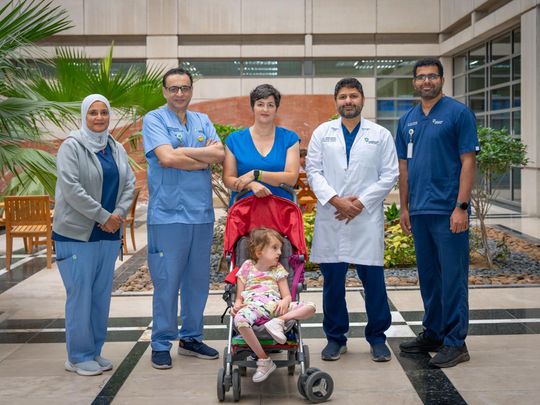
A three-year-old girl from Romania came to American Hospital Dubai with hip dislocations caused by partial trisomy of chromosome 7 – a rare genetic syndrome. The human body has 23 pairs of chromosomes, one of each in the pair inherited from the mother and father. A chromosome resembles a fine thread and is the microscopic part of a cell that carries our DNA. Trisomy is where there are three sets of a particular chromosome rather than the normal pair. Trisomy of chromosome 21 causes Down syndrome which has well-known features. However, partial trisomy of chromosome 7 is very rare and children with this condition can have many different effects on their body.
This three-year-old girl was born with both hips dislocated. The partial trisomy of chromosome 7 resulted in a combination of muscle tightness and stretchy joints causing dislocations in both hips. She was initially treated in Romania and both hips were placed in to a splint and later a plaster cast. As soon as she came out of these, the hips re-dislocated. After several attempts it was felt that the hips could not be relocated.
The parents sought many opinions across Europe and the general feeling was that surgery to place the hips back in would be unlikely to succeed. Meanwhile, the girl was making good progress with physiotherapy with attempts to get her to stand. However, her physiotherapy was set back by how much hip pain she experienced every time they tried to make her stand. The parents were keen to have the hips re-assessed to see if a solution could be offered.
During a family trip to Dubai, the parents sought medical consultations to see if their daughter’s hips could be treated. After seeing many doctors with no favourable response they came to American Hospital, one of the leading private hospitals in the UAE, to consult Dr Assad Qureshi – a leading expert on childhood hip dysplasia. Dr Qureshi, a Consultant Paediatric Orthopaedic Surgeon, felt it was a uniquely challenging case – the hips were dislocated because the joints were floppy but the tightness meant that the hips couldn’t be stretched back into place. Dr Qureshi suggested a dye injection study to explore the anatomy of the hip in detail. He also shared the case with an international forum of 1,400 paediatric orthopaedic surgeons from around the world to seek a solution.
Although many colleagues felt that surgery would not succeed, an American doctor suggested that these hips may have features similar to arthrogryposis – another syndrome causing hip dislocation due to muscle tightness where surgery can be successful. The dye contrast study also demonstrated that the sockets of the hip joint were deep enough to attempt placing the hips back in surgically if the muscle tightness was also addressed.
Unfortunately, the family were unable to secure funding for treatment outside of Europe. Dr Qureshi suggested they visit a famous international paediatric orthopaedic institution with a European treatment centre to see if they would be willing to do the surgery. The family visited the centre but were advised that the hips would be difficult to address and the focus should be on rehabilitation. The family resolved to gather charity donations to fund their daughter’s treatment at the American Hospital in Dubai.
This January the patient underwent surgery by Dr Qureshi to correct her left hip followed four weeks later by surgery to her right hip. Both surgeries took many hours but proceeded smoothly with anaesthetic supervision from Dr Ahmed AbdulAziz, Consultant Paediatric Anaesthetist. The child spent one night observation in the Paediatric Intensive Care Unit at American Hospital – a world-class unit enabling complex paediatric surgery. After both surgeries, the child was discharged after two days in excellent health. The patient remained comfortably in a plaster cast for six weeks while the family enjoyed the lovely weather in Dubai. After the plaster cast was removed, the X-ray confirmed both hips were well located. This was the first time the hips were in without any external support. The family are delighted with the outcome. They have already commenced rehabilitation with physiotherapy and are due to continue this after their flight back to Romania in the beginning of April.
American Hospital Dubai's medical excellence in complex disease treatment and benchmark surgical expertise have earned it a leadership position in the global healthcare landscape. The remarkable accomplishment of surgically correcting this three-year-old's complex condition, which the parents felt could not have been treated anywhere else, exemplifies American Hospital Dubai's commitment to delivering transformative medical care.



